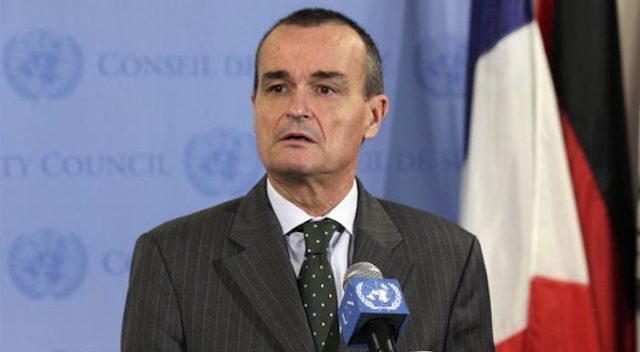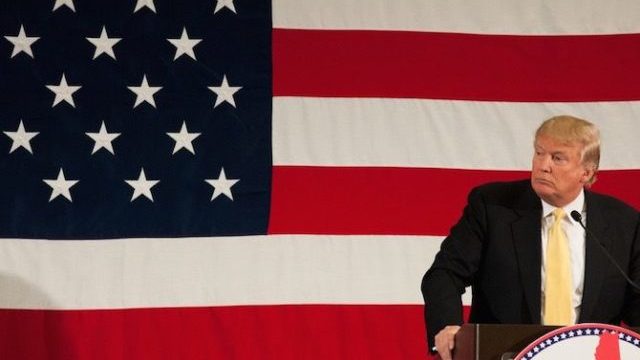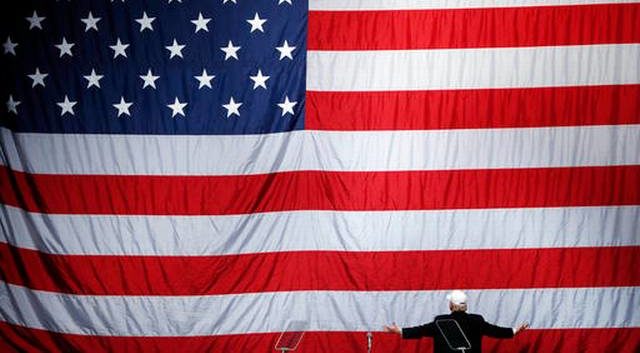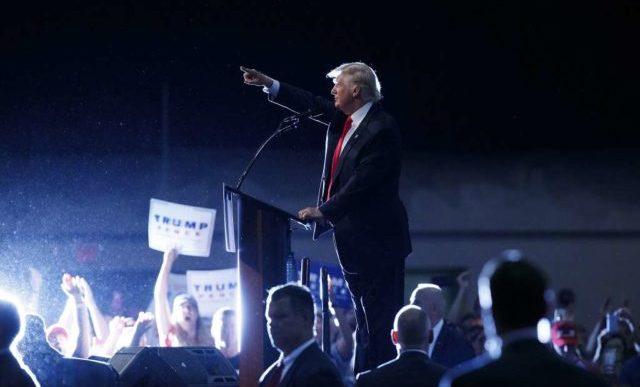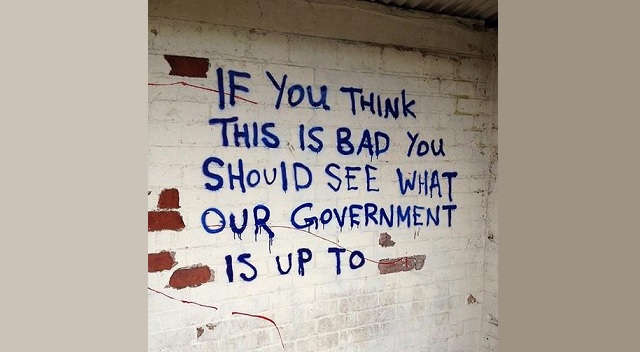What have we learned over the past 16 months in the presidential campaign that pitted billionaire business mogul Donald J. Trump against career-grifter Hillary Rodham Clinton? We’ve learned that:
- George Soros––the billionaire puppet-master and sugar daddy behind Trojan Horse Barack Obama and money prostitute Hillary––is now irrelevant. The moneybags hedge-funder, who once boasted that his days as a young man in Hungary collaborating with the Nazis to identify his fellow Jews and send them to their grisly deaths were among the best of his life. But President-elect Trump trumped Soros into oblivion!
- The polls are always wrong, manipulated and skewed as they are by leftists.
- The media are comprised largely of leftwing shills, including the narcissistic scribes, broadcasters and legislators who spent eight years touting Obama’s incentive-killing, socialist-promoting, and utterly failed ideas, among them Obamacare and Common Core, just two examples of the disastrous programs that will be scrubbed in a Trump presidency, resulting in genuine help for people in matters of health and education for their children.
- The pop-up, Soros-financed leftist groups like Occupy Wall Street, Black Lives Matter, even the Boycott, Divest and Sanction movement against Israel––all based on the left’s hatred and prejudice––will vanish as Americans under President Trump go back to work and come to realize that the psychotic jealousy that fuels these groups has hurt and not helped either themselves or our country.
- The IRS, FBI, Justice Department, even a Supreme Court justice, et al, can be had for a price or a threat.
- The Muslim Brotherhood, now seeded throughout every department and in the highest reaches of our government, were determined to implement Sharia law in the U.S.––throwing gays off roofs, murdering women for dating infidels, et al––will be abolished under President Trump after he takes the biggest broom in history to sweep them out of our constitutional republic and into the trash bin of American history.
- The Republicans in Name Only (RINOS) who were oh-so-cozy with the Democrats they pretended to fight were exposed as generally execrable weaklings and traitors to conservatism, and they too will be history as President Trump accomplishes more in eight months than all of them accomplished in eight years.
- The temper-tantrum conservative set––Wm. Kristol of The Weekly Standard, Jonathan Tobin of Commentary, Rich Lowry of NRO, at least half of the “fair and balanced” panelists on Fox News, the sellout list is too long to enumerate here––will never regain their credibility. And that is not to omit preening broadcasters like Norah O’Donnell of CBS, Chuck Todd of NBC, George Stephanopoulos of ABC, Andrea Mitchell and Rachel Maddow at MSNBC, and the entire staff of the Clinton News Network (CNN).
All of them were WRONG––100 percent wrong in predicting a Hillary victory!
WHAT THE LEFT HAS FOUGHT FOR BUT THANK GOD LOST
Ask yourself, what were all these media leftists fighting for? Why did they support the most dishonest, manipulative, corrupt, money-obsessed, and––most important––unaccomplished un-feminist in U.S. history? Clearly their bosses, from the six organizations now responsible for 90 percent of all the “news” we read, watch and listen to, had a vested interest in supporting Hillary because they colluded with her in both her embrace of globalism and in her vast pay-to-play schemes. These delusional one-world-order people have invested their millions and billions with the conviction that:
- American strength is a bad thing because––oh, horrors!––America has more wealth, military strength, and freedoms than other countries, and that is plain “not fair,” ala the Communist doctrine the left embraces. According to that historically failed doctrine, everyone should suffer equally, except for the oligarchs who live lavishly and take decadent vacations on the money their slavish subjects pay them in taxes. Sound familiar?
- Sharing wealth is a good thing. But, of course, it’s totally phony, given that poor people never see the benefits. See the records of the Clinton Foundation’s slush fund where billions of dollars were raked in but less than six percent given to charity, while other billions were raised for Haiti, but Haitians are still sleeping in the streets! Now we learn that the immoral chip doesn’t fall far from the old blocks; Chelsea Clinton used Clinton Foundation money to pay for her wedding and afford herself an $11-million-dollar apartment in NY City, and her husband used Foundation money to help finance his hedge-fund business.
- Supporting tin-pot dictators, communist strongmen, and theocratic regimes is a good thing, and that includes sending billions to the terrorist state of Iran to bolster its nuclear program, a program that the murderous mullahs admit every day is designed to “obliterate Israel.”
- Electing a half-black president is a good thing because it “empowered” the 14-percent of black people in our country to feel good about themselves. The net result? Sky-high unemployment and more crime, imprisonment, food stamps, broken families, misery and dependency in the black community than in the past 40 years! But, in fairness, a few rocking moments when Jay Z, police-hater Beyoncé, and other performers went on stage in Ohio the other day and out of respect for Hillary proceeded to spew the words nigga and f.ck and sh.t dozens of times. This is what we’ve come to!
Luckily, happily, blessedly, America is so much stronger than the toxic invasion we’ve experienced over the past eight years––including a “president” who went around the world bad-mouthing our country. But neither he, nor his wife. nor the skewed polls, nor the embrace by the show business lefties, nor the almost-uniform lack of endorsement or support Donald Trump received from Republicans in his amazingly energetic and inspiring campaign could stop the AMERICAN PEOPLE from electing this brave man.
Brave because he went up against an almost impenetrable wall of resistance, lies, slurs, and over-reactions from both left and right know-it-alls and a vicious but ultimately impotent media.
Yet, in the end, President-elect Trump prevailed, again thanks to the AMERICAN PEOPLE!
At the very beginning of his campaign, when he spoke about building a wall to keep out drug dealers and rapists, and having Mexico pay for it, a CNN reporter took exception to his use of the words “illegal aliens.” Like a school marm, she lectured the candidate: “they are now referred to as undocumented citizens.” Mr. Trump looked at her and said, “Well, I call them illegal aliens.”
That exchange, in my opinion, was the moment that most Americans––the Americans who made him the President tonight––connected to this immensely wealthy but plain-spoken man who told it like it is, who rejected outright the politically correct phrasing that has turned grown men into 97-pound weaklings, grown women into tongue-tied children, and politicians into spineless wusses.
ON BOARD FROM DAY ONE
Personally, I was on board from day one. On June 16, 2015, I was watching TV with my husband Steve when we witnessed an unprecedented event––a fabulously successful billionaire real-estate magnate, philanthropist, and TV personality announcing that he was running to be President of the United States.
I immediately hit my computer and three days later my article appeared on multiple conservative sites, de facto endorsing Donald Trump, the only candidate––out of a field of 16––to offer credible solutions to the overwhelming problems now plaguing our country, problems created with malice aforethought by Barack Obama, Hillary Clinton, and their Marxist ilk.
While several of the other candidates suggested some pretty good solutions, the quality they all lacked––which Donald Trump had in spades––was an actual track record. Each candidate talked a good game, but after eight years of Barack Obama trampling on our Constitution, circumventing the political process with his dictatorial Executive Orders, and spitting on our Bill of Rights, the candidates running against Trump had nothing to show for all their fancy words. They had either joined the opposition, caved to bribes and threats, or simply exhibited their own endemic character weaknesses.
In stark contrast, candidate Trump was all about accomplishment. Say you’re going to rebuild an ice-skating rink in NY City from decades of decay and leadership that never got it done, and he presented a show-stopping new rink in a matter of months and remarkably under budget––and he paid for it himself!
Say you’re going to restore the landmark 1899 Old Post Office and Clock Tower on Pennsylvania Avenue in Washington, D.C. that incompetent people wanted to tear down, and President-elect Trump once again, just a week or so ago, came in in record time and under budget and completed the magnificent luxury hotel right in time for his 2017 presidential inaugural parade!
Mr. Trump was like no presidential candidate Americans had ever seen. He didn’t parse his words to conform to the preposterous and destructive political correctness and multiculturalism that has plagued our country since liberals entered their radical Alinsky years in the 1960s. And when Mr. Trump enumerated the sky-high mountain of Barack Obama’s failures, Americans believed that the master builder himself was more than capable of both fixing the problems and draining the D.C. swamp. Here is a partial list of the challenges before him:
- An annihilating national debt––$20 billion and climbing daily.
- Crippling unemployment with 94-million people unemployed––nearly a third of our population––out of work.
- Porous borders over which millions of illegal aliens––many of them career criminals––pour every day.
- Sanctuary cities that spend taxpayers’ hard-earned dollars to support illegals, again often criminals, but most often deadbeats who bleed our social-welfare systems dry.
- Obamacare, doomed to fail from its inception, is now leaving millions without any coverage, forget about “affordable” healthcare.
- Race relations that were at an all-time high until a racist president, two racist attorneys general, and a racist secretary of state created and fanned their racist agendas throughout our country.
- A so-called foreign policy that bowed to America’s enemies and alienated our faithful allies, resulting in a terrorist state (Iran) with nukes, North Korea detonating nukes, Russia taking over the Middle East, the military of our enemies more equipped to combat attacks on our homeland than we are, on and on.
But the good news is that America’s allies are more eager than ever to have a President Trump on their side, and that our strongest ally Israel is now being embraced by former enemies Saudi Arabia and other Arab countries, thanks to the mortal threat B. Obama created by his seemingly erotic attraction to our enemies.
HALLELUJAH!
Break out the champagne, let loose the balloons and confetti, give praise to our Founding Fathers for creating an America of freedom and opportunity that still, 240 years later, resonates with the American people.
As everyone wakes up to a President Trump on Wednesday, November 9, 2016, they can thank God to finally be rid of George Soros and his employees Barack Obama, Bill & Hillary Clinton, and their vast retinues, as well as the thoroughly discredited and corrupt media, the hundreds if not thousands of writers and commentators who will never again be taken seriously.
They can also be thankful, as blogger Jeff Dunetz spells out, that a President Trump will bring about significant changes in the following areas (this is the short list):
- A conservative Supreme Court.
- Improving the American gene pool by supporting the threats of far-leftists like Al Sharpton, Barbra Streisand, Stephen King, Alec Baldwin, Ruth Bader Ginsburg, and Cher, et al, to leave the country in the event of a Trump victory.
- Restoring America as leader of the free world.
- Ripping up the Iran deal to protect Israel, and declaring Jerusalem the capital of Israel. Quite a difference from Hillary and her virulently anti-Semitic advisors Sidney Blumenthal and his rabid son Max.
- Lowering taxes across the board.
- Directing all departments of government to cut the strangulating regulations.
- Mandating that America win again in any conflict our country engages in, and absolutely supporting our military to crush ISIS!
This is what the American people heard loud and clear from candidate Trump, and supported and applauded and came out in record numbers to let the skeptics and naysayers and haters know that they believed he was capable of leading the charge to Make America Great Again.
What last night’s victory means is that for the next four and hopefully eight years, we’ll have someone in the White House who actually loves America, and that it is not the self-appointed political so-called experts who choose the American President, but rather We the People!

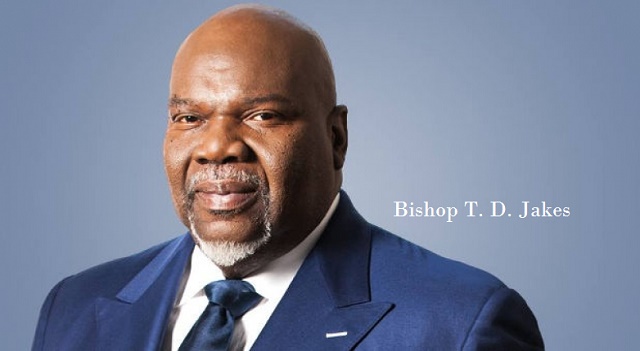

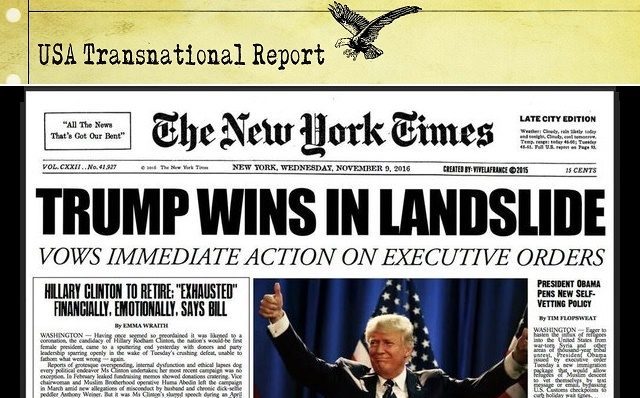


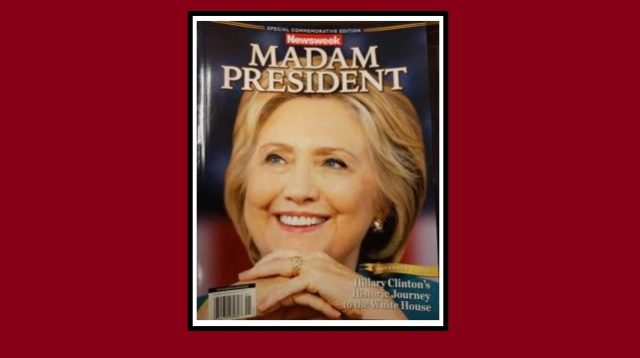
 A copy of the Newsweek magazine with the cover photo of Hillary Clinton with the headline “Madam President” is now selling on eBay for as high as $595.
A copy of the Newsweek magazine with the cover photo of Hillary Clinton with the headline “Madam President” is now selling on eBay for as high as $595.


